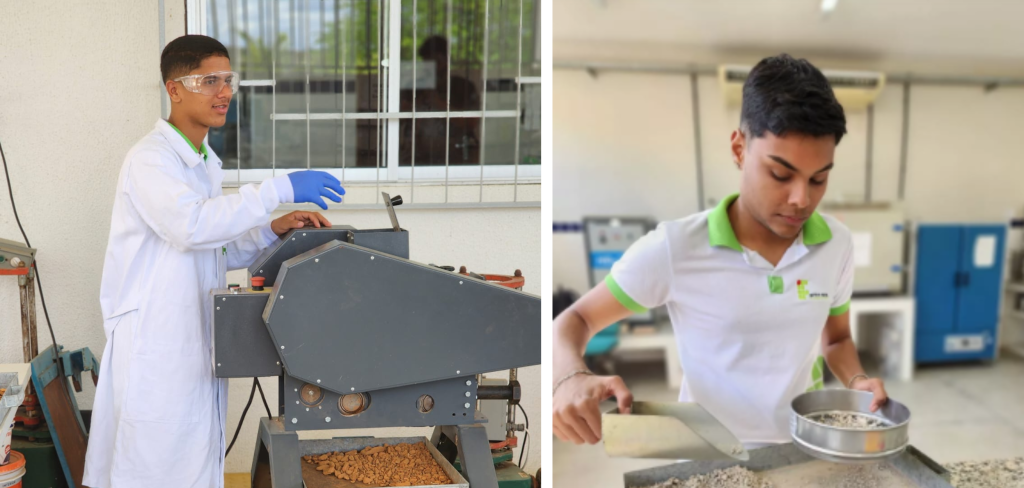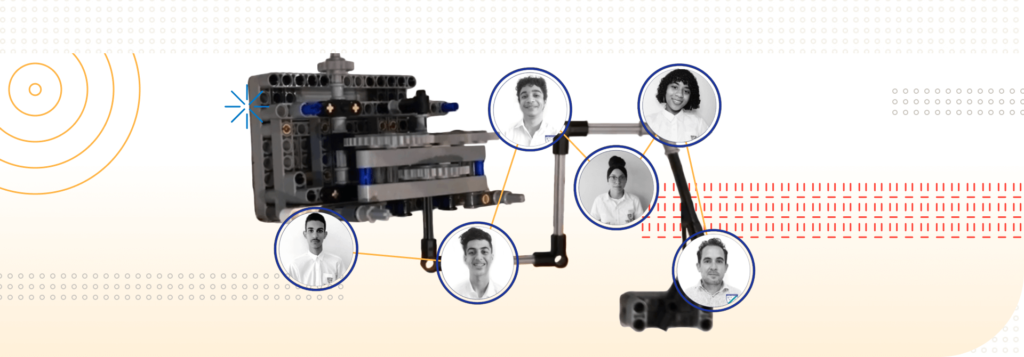Whether due to a lack of technology or information, in many places in Brazil solid waste is not disposed of properly. This is the case of São Paulo do Potengi, a city in the state of Rio Grande do Norte, in the northeast of the country. The construction debris, which is often seen on the city’s streets and vacant lots, served as inspiration for a group of students who were among the winners of Solve For Tomorrow Brazil 2023, by popular jury.
The team members were in their third year of the integrated technical course in Buildings at the Instituto Federal do Rio Grande do Norte (IFRN). They developed a prototype for a mini recycling plant for materials discarded from construction sites. Using this waste, they created objects made of cement, mortar and bricks, as well as the correct disposal of what cannot be reused. Entitled “Sustainable SPP: Recycling in Potengi”, the project emerged during the Construction Materials course, as explained by the mediator teacher Neuber Araújo. “We talked about recycled materials, because it is my area of research since my postgraduate studies. So, I always ask the students what problems exist in their city, what type of waste they see in inappropriate places and how we can try to solve it”, he explains.
Based on these reflections, the students came up with ideas about what could be done with certain types of waste, such as construction stones. Using the structure of the Federal Institute, the team built a prototype not of a product, but of a production flow. “For this project, we needed a basic laboratory structure that is available at IFRN, equipment that crushes the waste to transform it into sand, and some basic component materials, such as cement. Everything was provided by the Institute,” explains the educator.

Step-by-step: from waste to brick
The group established the stages of the process, starting with waste collection and moving on to sorting, selecting only those in category A, established by the Brazilian National Environmental Council (Conama). That is, only waste considered “reusable or recyclable”.
These materials are then sent to the crusher to be processed and transformed into recycled aggregates. This result alone could be a product to be sold. But the team went all the way and wanted to transform this waste into bricks. To do this, they mixed the aggregate with cement and water, without the need for burning, as is the case with standard bricks, making the solution even more sustainable. In addition, several cement artifacts can be produced from this prototype, being useful for construction or even handicrafts.
I always tell students that when a project is subject to different points of view, we have to use this in our favor. I’m glad we didn’t give up back then! says Neuber Araújo.
The compact plant for recycling construction waste is an option for people to avoid having to rely on municipal collection or disposal in places that are not environmentally prepared to receive these materials. This way, it is possible to avoid problems such as environmental and visual pollution, the proliferation of disease-carrying insects and higher cleaning costs.
Results led to partnerships with the City Hall
To achieve the final result, the teacher says that, in order to deepen this knowledge about construction materials, extra hours of guidance and mini-courses were necessary.
And, to disseminate the knowledge acquired, the team gave workshops and mini-courses to the community and created a podcast and a site on social media to share useful information.
With the visibility given to the project, the City of São Paulo do Potengi, through the Municipal Department of the Environment, approached the project to learn more and try to put some of the ideas into practice starting in 2024.
Since the students still have one year to finish their technical course in Buildings, the idea is to expand the scope of the project. Within the Federal Institute itself, postgraduate programs in the environmental area are interested in studying the products developed. A construction company is also considering reusing the materials generated in its own projects with the “Sustainable SPP” technology.
Now, the team’s focus is to transition the mini recycling plant so that new students can continue the project. Neuber Araújo also highlights the positive results in the academic training of the young people involved. “We are already participating in scientific events in the area. We had two articles approved at the Brazilian Concrete Congress, to make this knowledge visible in the technical area of Civil Construction and to make our contribution. The kids will already leave with a very high intellectual capital, they will arrive at graduation with published articles and participation in events, which will be a differential”, says Araújo, excited to register new projects in the next editions of Solve For Tomorrow.




